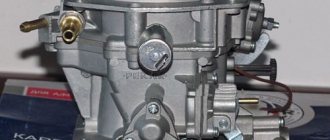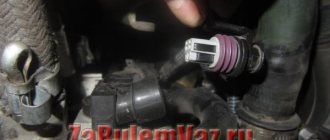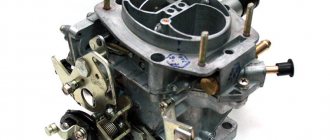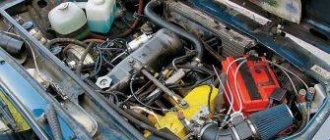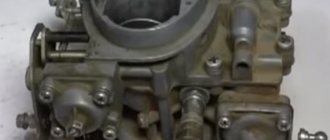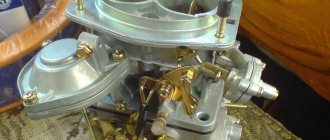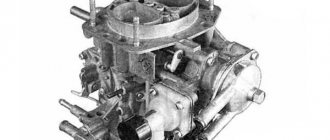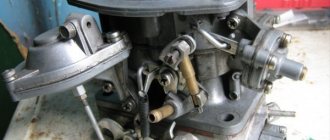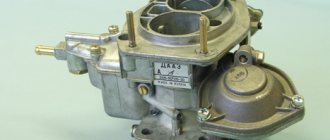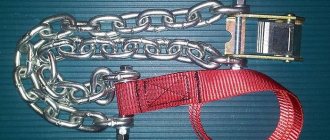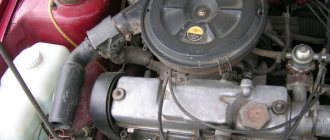On carburetor engines of VAZ 2108, 2109, 21099 cars, the recommended idle speed is 750-800 rpm. At the same time, they must be stable (without frequent misfires and “triples”). It is recommended to adjust the idle speed of engines with carburetors 2108, 21081, 21083 Solex once every six months or if problems arise with engine operation.
Preparatory work
Before carrying out the adjustment, at a minimum, it is necessary to make sure that the spark plugs, high-voltage wires, the distributor cap, the “slider” are in good condition, that the ignition timing is set correctly, that no foreign air is being sucked into the carburetor, and that the fuel pump is in good working order.
In addition, you should warm up the engine to operating temperature (80-90 degrees) and fully open the carburetor air damper, pushing the “choke” handle all the way.
It is not necessary to disconnect and plug the vacuum supply tube from the carburetor to the vacuum ignition timing regulator. Although, after adjusting the idle speed, you can remove it from the fitting on the vacuum regulator housing and check whether there is a vacuum in it when the engine is idling. At correctly adjusted speeds, there should be no vacuum there or it should feel very light.
Tools required for adjusting idle speed
Fine-tuning the idle speed is carried out using a gas analyzer, but not everyone has one. Therefore, it is advisable to have a separate device - a tachometer. If it is not available, you can use the tachometer built into the instrument panel (available on all VAZ 2108, 2109, 21099). You will also need a thin slotted screwdriver.
Adjusting the engine idle speed
Let's start the engine. We turn on the high beam headlights and the heater.
— The simplest way to adjust the idle speed of an engine with a Solex carburetor (2108, 21081, 21083) is to rotate the fuel mixture “amount” screw.
Counterclockwise the revolutions decrease, clockwise they increase. When the screw rotates, its tip acts on the lever of the throttle valve axis of the first chamber of the carburetor and thereby either opens the throttle valve of the first chamber of the carburetor, or, conversely, closes it. Because of this, the air flow passing through the first chamber and the vacuum in the CXX channel increases or, conversely, decreases. Thus, the “quantity” screw regulates the volume of fuel entering the engine cylinders. Accordingly, the engine idle speed will either increase or decrease.
The image shows the screw for adjusting the “quantity” of the fuel mixture of Solex carburetors (2108, 21081, 21083). The carburetor choke lever has been removed for clarity.
More precise tuning involves additional adjustment of the composition of the fuel mixture entering the engine cylinders.
The “quality” screw of the fuel mixture is responsible for this in the 2108, 21081, 21083 Solex carburetors.
To begin with, you can set the initial position of the “quality” and “quantity” screws of the carburetor. This is 3 full turns from the stop of the “quality” screw; the “quantity” screw should be set to the minimum crankshaft speed - 600-700 rpm.
— At the next stage, it is necessary to set the maximum idle speed, using only the “quality” screw of the fuel mixture.
Using a slotted screwdriver, gradually unscrew it from its socket until the idle speed reaches its maximum. It can be 1000 rpm or slightly higher.
— Next, use the “quantity” screw to set the speed to 900 rpm.
We achieve this by slowly rotating it counterclockwise.
— Using the “quality” screw, we set the idle speed at the required level of 750-800 rpm.
To do this, again slowly, wrap it clockwise.
If it is not possible to immediately achieve the desired crankshaft speed, we carry out the adjustment again.
The idle speed of the engine with a Solex carburetor has been adjusted.
— A second, more precise adjustment using both carburetor trim screws will lead not only to a stable and stable engine idle, but also to a decrease in the toxicity of exhaust gases.
— If “dips” occur when you press the gas pedal after adjusting the idle speed in this way, you should slightly turn the “amount” screw of the fuel mixture clockwise, thereby adding a little of the fuel mixture entering the engine cylinders from the idle system. After this, the engine speed will increase slightly, the limit value for engines of VAZ 2108, 2109, 21099 cars is 900 rpm.
— In some cases, it makes sense to modify the carburetor idle system. See “Modification of the idle system of Solex and Ozone carburetors.”
Five more articles on adjusting and tuning the Solex carburetor
Comparative car repair test
On all cars of the “ninth” family, the engines were equipped with domestically produced Solex carburetors. The only exceptions are later modifications, on which the manufacturer installed injection power units. Although far from being the most technically advanced vehicle, the Nine is still popular among car enthusiasts. This is largely due to the car’s maintainability and the relatively low cost of spare parts. In addition, a significant part of the restoration and adjustment work can be carried out by the owner himself, including adjusting the VAZ-2109 and 21099 carburetor, tuning it and cleaning it.
This article will consider only those operations that every car enthusiast can perform with his own hands. Don’t be intimidated by the large number of manipulations - follow the instructions, be careful, and setting up the VAZ carburetor will go no worse than in a service station. This way you can save time and reduce machine maintenance costs.
You can clean and adjust the carburetor for the VAZ nine yourself, in the garage
Preparing the carburetor for tuning
Before you begin adjusting the VAZ-2109 carburetor and other modifications of the model, you should ensure unimpeded access to its parts by removing contamination. If the car is used regularly, then the carburetor needs external flushing only in the case of adjustment procedures or to clean the moving mechanisms if they are heavily contaminated. External washing is carried out using a brush, a clean rag and a liquid that can dissolve oil (gasoline, kerosene or a special cleaning composition). This procedure does not involve removing the carburetor and consists of the following operations:
Pros and cons of the unit
The Solex carburetor is good because it is able to provide the Nine engine with the necessary amount of fuel in all operating modes, up to the most dynamic. At the same time, it is famous for its efficiency; the actual consumption of a working car on the highway rarely exceeds 6 l/100 km, in the city - 7.5-8 l/100 km. Therefore, many owners of Muscovites, Volgas and old Zhiguli cars were happy to install Solex on their cars. By slightly tuning the VAZ 099 carburetor, it can be installed on a Gazelle or UAZ with an engine capacity of 2.4 and 3 liters.
A little about the disadvantages:
How to set up a VAZ-2109 and 21099 carburetor in a garage
According to the recommendations of experts, adjustment of the VAZ-21099 carburetor should begin with the float chamber. Using this procedure, it is possible to check and establish the optimal fuel level. You need to configure it by following the steps below step by step:
- Start the engine and turn it off after 2-3 minutes;
- After the air filter has been removed and the fuel hose has been disconnected, remove the carburetor cover (to do this, you need to unscrew five bolts). Place the lid on a clean surface with the floats facing up, being careful;
After removing the air filter, disconnect the fuel supply and remove the carburetor cap
- Using a caliper, determine the fuel level in the float chambers: the distance between the edge of the housing and the upper level should be 25.5 mm. If it turns out that the measurements do not comply with the standard, you will have to make an adjustment by bending the tongue of the float bracket and re-measuring the fuel level;
Additionally, you can check how the edges of the floats are located relative to the mating surface of the cover and, if they are not parallel, adjust by acting on the float brackets.
How to adjust the throttle valve actuator
Before you begin adjusting the damper itself, you should check the degree of cable tension. If it turns out that the cable is slack or its tension is too strong, then adjusting the VAZ-21099 carburetor involves starting to adjust the drive in such a way as to prevent the damper from completely closing. To do this, use a wrench set to “13” and tighten the end nut on the cable sheath. Next, use the same key to gradually loosen the locknut.
Now you can set the optimal distance between the carburetor and the tip of the nut. It should be taken into account that in the free position of the accelerator pedal, the damper must be completely closed. All that remains is to tighten the nut and the setting can be considered complete.
How to adjust the air damper actuator
First, the free movement of the thrust must be checked - this will require dismantling the air filter cover. The drive settings can be considered correct only if the air damper is fully opened in the “recessed” position of its handle. If deviations from the norm are detected, read the instructions on how to adjust the carburetor on a VAZ-2109 by performing a series of adjustments.
Throttle adjustment is an important part of the carburetor tuning procedure.
The drive setup process looks like this:
- Loosen the bolt that secures the rod to the lever. After this, you need to recess the drive handle and fully open the air damper, acting on its lever;
- Using pliers, pull the cable out of the sheath and tighten the fixing bolt;
- Next, you need to check how the damper closes when the handle of its drive is extended. Closing must occur completely, otherwise the adjustment operations will have to be repeated.
- The adjustment should be made until you achieve complete opening and closing of the damper in the extreme positions of the drive handle. Make sure that the lever does not come into contact with the cable jacket in any position.
So, at this stage, you have learned how to adjust the carburetor on a VAZ-2109 by setting the optimal operating position of its throttle and air dampers. Now let's move on to adjusting the starting device and idle speed.
Self-adjustment of the starting device
The most precise adjustment of the starting device by setting the values of the starting gaps requires removing the carburetor from the car. But first you need to make sure the integrity of the trigger device diaphragm. To do this, unscrew the four bolts, remove the cover and inspect the diaphragm. If it is suitable for further use, you can continue to make adjustments, otherwise the part will have to be replaced.
Below is a list of operations performed one by one, which describes how to adjust the VAZ-21099 carburetor by adjusting the starting device:
- First you need to close the air damper by turning its lever;
- Using a screwdriver, press down the starter rod;
- The gap formed between the chamber wall and the damper must be measured, and then its value must be compared with the calibration data (indicated by the manufacturer individually for each carburetor model and car);
- If the received data does not correspond to the nominal value, adjustment should be made. The locknut, which is located on the accelerator pump housing, should be loosened and the adjusting screw should be turned with a screwdriver until the required clearance is established;
- Now, having closed the air damper, it is necessary to measure the clearance of the throttle valve of the first chamber. Check the obtained data with the calibration table. If necessary, set the desired gap value by turning the damper adjusting screw.
It is likely that at this stage the adjustment of the VAZ-2109 carburetor can be completed. If you need to adjust idle speed or improve fuel consumption, you can read the relevant guide below.
Recommended Method
Level control technology includes a number of stages:
- We dismantle the housing of the air filter element. To do this, unscrew the fastening nut of the housing cover, unclip the latches, remove the cover, take out the filter and tighten the 4 nuts that secure the housing to the carburetor.
- Raise the body and disconnect the rubber pipes. We move the body to the side.
- Loosen the clamps securing the fuel pipes going to the carburetor and disconnect them.
- Remove the wire suitable for the idle speed solenoid valve;
- Disconnect the drive cable of the air damper (the “choke” handle);
- Unscrew the 5 screws securing the carburetor cover;
- Having removed the cover, we immediately determine the fuel level in the chambers by lowering a ruler or caliper into one of them until it stops (using its depth gauge). If the measurement shows a level of 25-26 mm, it corresponds to the norm and no adjustment is required;
If the amount of fuel in the chamber is lower or higher than normal, we perform a visual inspection and a series of measurements on the floats, and if necessary, we correct their position.
To carry out adjustment work, place the removed carburetor cover on a flat horizontal surface with the floats facing up.
First, we look at the position of the elements from above. The outer side surfaces of the floats are parallel to the special imprints on the gasket. Deviations can cause the floats to touch adjacent elements and surfaces, causing the fuel level to be incorrect. If necessary, adjust the position of the floats by bending their mounting arms. The next step is to measure the gap between the floats and the gasket. A rod with a diameter of 2 mm is useful here - this is how much the specified gap should be.
If it does not correspond, we bend the tongue of the floats, with which they act on the locking needle. After this adjustment, we check the total height of the floats, which is normally 34 mm. If this is not the case, check the gap again, adjust it if necessary and measure the height again.
The last stage of setup is determining the working stroke of the floats. To do this, place a caliper near the float, mark the distance from its lower corner to the surface of the cover, then lift the float with your hand and mark where the lower corner is.
A working stroke of 15 mm is considered normal; if it differs, it is adjusted by bending the tongue.
Signs of a Solex carburetor malfunction
Before adjusting the carburetor on a VAZ 2109, you need to familiarize yourself with the associated faults so as not to repair the unit just like that.
So, the reason after which the VAZ 2109 carburetor is adjusted is considered:
Fuel mixture too rich. Experienced auto mechanics know that for an ideal ratio of fuel and air, a value of 1 to 15 is required. This means that for the combustion of 1 kg of fuel, 15 kg of air are needed. If the mixture is called rich, it means that the fuel level is higher than the nominal level.
Symptoms: the engine is difficult to start, black smoke from the exhaust pipe, spark plugs with black soot and lumbago in the exhaust system. The fuel supply system quickly becomes clogged.
The following signs can be called a consequence of the previous ones and this is:
- Unstable idle speed;
- Increased fuel consumption;
- Deterioration of starting properties;
- Reduced engine response.
The operating principle of the carburetor and fuel supply system forces car owners to perform such a procedure as adjusting the VAZ 2109 carburetor at least once every six months. The mechanism on a car with a carb needs to be lubricated once a month, unlike a car with injection, which has injectors. Everything is extremely easy to adjust.
Alternative way
There is a simpler method for determining the correct position of the floats, which does not require measurements. Place the carburetor cover on a flat table and look at the stampings made on the side surfaces. When the floats are in a normally adjusted position, these strips are parallel to the lid.
Then we lift the floats up and look at their bottom, which after lifting should be parallel to the surface of the lid. If necessary, adjust the position of the floats by bending the tongue.
After adjustment work, we assemble the carburetor.
Reasons for failure of the VAZ 2109 carburetor
The Solex carburetor is a very sensitive device, which contains a large number of small channels. When a huge amount of low-quality fuel passes through them, you may encounter the fact that they become clogged with impurities and stop functioning.
The first thing that may immediately become noticeable is a decrease in idle speed. In the future, the car does not start well and needs carburetor adjustment.
This procedure is divided into several stages:
- Removing the unit
- Disassembly and cleaning
- Assembly and installation
- Carb idle adjustment
↑
Common faults
Since carburetor “nines” are not produced, the units on the remaining machines are pretty worn out. Despite the complexity of carburetors, some malfunctions in them can be fixed with your own hands. Here is their list:
- failure to idle;
- increased fuel consumption;
- unstable operation with “floating” speed;
- deterioration of the acceleration properties of the VAZ 21099.
The first reason for the disappearance of idle speed is a clogged nozzle of the solenoid valve screwed into the cover. The second is less common: failure of the electronic unit that controls the EPH mode or the valve itself. In the first case, you need to temporarily apply a voltage of 12 V directly to the valve from any point; in the second, you need to bite off or throw away the needle of the broken valve that blocks the nozzle hole. Also, the idle speed disappears when the small rubber ring placed on the fuel channel bushing (located under the cover) becomes limp.
Fuel consumption increases for the following reasons:
- air jets are clogged;
- the needle valve has lost its tightness;
- the economizer diaphragm is worn out;
- The dampers of both chambers are worn out, causing the engine to draw fuel through the resulting cracks.
When the rubber ring on the electric valve becomes limp, there is a “floating” of revolutions, the impossibility of regulation and increased consumption. As a temporary solution, the ring can be discarded and the valve tightened without it. Unstable operation is also caused by air leaks under the “sole” of the carburetor, which is eliminated by an additional cardboard gasket. Before installation, the gasket must be immersed in warm water for a few seconds so that it can then swell.
It is unacceptable to rub the “sole” of the carburetor with abrasives for the purpose of leveling.
Acceleration dynamics often return after replacing the accelerator pump diaphragm and cleaning the nozzles. Correct adjustment of the 21099 carburetor is carried out only with the help of a gas analyzer that measures CO. Its readings at idle speed should be in the range of 0.8-1.5, at operating speed (2000 rpm) - 0.8-2.0.
Removing, disassembling and cleaning the carburetor VAZ 2109
If all of the above symptoms are detected, you can begin to remove and disassemble the carburetor. On a VAZ 2109, repairing a Solex carburetor is possible using a repair kit. It is recommended to purchase a repair kit in advance to immediately replace all gaskets, jets and valves. The table contains data on jets and all necessary valves. The machine must be stationary. When sorting out the parts, the most important thing is not to lose anything.
To remove and configure the device, you need to open the hood and disconnect all the hoses from it. They are mounted on clamps, so it is recommended to stock up on a screwdriver in advance. The next stage is the cable for driving the gas pedal and air damper. Both elements can be removed quite easily. After this, remove the chip from the idle speed economizer. Dismantling is carried out extremely carefully so as not to damage the contacts. Taking everything apart is even easier.
Recommended flow rates of pneumatic economizer jets for various operating conditions
| Operating conditions | Flow capacity cm³/min | Operating conditions | Flow capacity cm³/min |
| Light road conditions with heavy loads (economical adjustment) | 60 | Average road conditions |
You can now remove the four housing nuts that hold the carburetor to the intake manifold. If it is difficult to remove, you can pry it out with a thick screwdriver. Clog the manifold with a rag to prevent foreign particles from getting inside and clean the seating area of any remnants of the old carburetor gasket.
The carburetor itself consists of several elements:
- Top cover
- Bottom cover and float chamber
- Throttle valve block
First of all, the top cover is removed. At the same time, the condition of the needle valve and the condition of the float are checked. The valve should move without jamming and also easily return to its original position. You can immediately check the operation of the accelerator pump drive. All connections should turn easily. The operating principle of many mechanisms is very simple, and they must stand level. It is configured after assembly.
Now you need to separate the throttle body from the bottom cover. Everything is held in place with bolts, so a screwdriver will suffice. Once all components are completely disassembled, they need to be treated with throttle body cleaner or regular gasoline. Parts should be wiped with dry rags.
Removing a faulty device
Carburetor repair is a simple procedure. When removing it, there is no need to replace the pump, fuel pump or battery. The device of the VAZ 21099 car allows you to quickly remove the faulty device. To do this, all you need is a standard set of keys and a little patience.
- First, remove the air filter along with the filter element.
- Then we disconnect the air damper rod. It is located on the right side of the carburetor, in the direction of travel of the car.
- There we also remove the return spring of the gas pedal drive.
- Use a screwdriver to pry up the spring clamp on the gas drive sector and remove it.
- Then we remove the throttle cable from the drive sector.
- We disconnect all the wiring connectors from the carburetor, having previously marked their connection points so as not to confuse them during assembly.
- Loosen the clamps and remove the fuel hoses.
- Unscrew the screw and remove the heating block of chamber 1.
- We remove the crankcase ventilation hose, and then the vacuum tube going to the breaker - the ignition distributor.
- Unscrew the 4 fastening nuts and carefully remove the carburetor.
- To top it off, cover the outlet hole with a clean rag to prevent dirt from getting into it.
Main unit VAZ 21099
Installation is carried out in the reverse order of removal. Now you can begin disassembling and cleaning the carburetor.
Installation and assembly of the VAZ 2109 carburetor
After cleaning all the elements, you can assemble it. Check the clearances in the throttle valve block in advance and set them to the nominal values. For each type of unit, you can find all calibration data in reference books. Instead of old gaskets, it is recommended to immediately install new ones to avoid repeated disassembly after two weeks of operation. Installation of parts is done carefully.
Replace the needle valve if necessary. A faulty valve can negatively affect fuel consumption, as it backs up and allows a huge amount of gasoline to pass through the channel cross-section.
It is recommended to lubricate the damper drives, levers and rods with Seledol or Litol 24. It is not recommended to use this lubricant in an environment that comes into contact with gasoline. The grease is suitable only for external parts, such as the plastic joints for the carburetor rods. They may not stand.
The top cover is installed last and only after adjusting the level in the float chamber.
Quality screw removal method
With Solex carburetors, the XX channel in the body itself often becomes clogged, and in order to clear it thoroughly, it is necessary to remove the quality screw. But this screw, as mentioned above, has a very tight fit and is not easy to get out. There are several methods for dismantling a part; we will consider only one option.
We take a piece of an old antenna from any radio receiver, select the outer diameter so that the tube fits into the channel of the carburetor body, usually the outer thickness of the “puller” is about 4 mm. We cut off a small piece, make a cut at one end (about 1 cm deep), use another quality screw (a spare one, or you can buy it specially in a store), and check how tightly the tube fits onto the head of the screw.
Do-it-yourself carburetor float chamber level adjustment
Diagram of the float chamber with installation parameters: 1 - float; 2 - tongue; 3 - gasket; 4 - cover.
The level in the float chamber is necessary for smooth operation of the carburetor. A level that is too high will increase the fuel supply, while an insufficient level will reduce the throttle response of a carburetor engine, since the level will not be able to rise in time.
To adjust the level in the chamber, you need to turn the top cover over and bend the float as far as the antennae allow. The distance between the bottom corner and the cover should be 20 mm. If not, bend the tabs and install the top cover. This do-it-yourself adjustment of the VAZ 2109 carburetor is considered nominal. The principle of action here is simple.
Adjustment (step by step)
The problem with carburetor repair and adjustment is that the process must be carried out in conditions of cleanliness and maximum care. The HRV can malfunction even due to small specks in the tubes. Nevertheless, car owners can configure the control unit themselves.
What you will need
The adjustment process does not involve removing the carburetor; everything is done live. To work, you will need a flat table and a clean piece of light-colored fabric. We cover the table with fabric and place it next to the hood of the car. We lay out the necessary tools on the table: keys, pliers, Phillips screwdriver, flat screwdriver, ruler.
A vacuum cleaner and car air compressor may also be needed. A book on repairing a VAZ 2109 with a description of the components of the control unit, so that you can look there if necessary.
Below we will describe the process of adjusting the fuel level in the float chamber and setting the idle speed in stages.
Adjusting the fuel fluid level in the float chamber
There is no point in talking about fuel economy if the gasoline level is higher or lower than normal. To return to normal consumption, it is necessary to carry out a number of manipulations:
- After unscrewing the nut and opening the clamps, remove the cover of the filter mechanism housing and pull out the filter.
- Unfasten the EMG wire and hoses going to the carburetor.
- Loosen the 5 screws of the HRV cover and remove it.
- Lower a ruler to the bottom of the HRV chambers to determine the liquid level. If the measurements are 25-26 mm, then everything is normal and no adjustment is needed. If it is higher or lower than normal, we carry out further manipulations.
- Turn the removed lid over with the floats facing up and place it on the table.
- Adjust the floats by tightening the fasteners.
- Important rules for setting floats must be observed. They must be installed parallel to each other and vertically without distortion.
- Measure the gap between the floats and the gasket; it should be 2 mm. Otherwise, bend the tongue that acts on the support needle.
- Final stage. Identify the working stroke of the floats. If the floats are raised all the way up, the distance should not be more than 15 mm. A similar size should be achieved by bending the tabs.
Idle adjustment
In case of malfunctions of this kind, the engine runs intermittently at low speeds. You can also do the procedure yourself:
- Warm up the engine, then turn off and let it cool.
- Remove the filtration part of the heater and unscrew the EMG valve.
- Turn on the engine.
- Plug the idle air passage with your hand and apply the gas in this manner several times.
- Turn off the engine
- Blow out the EMG with a compressor, clearing it of dust and debris.
- Install all parts in place.
- Carry out the last manipulation to control the quality of work. To do this, you need to start the engine again. If the idle speed begins to work normally, it means the adjustment was successful.
More accurate adjustments can be made using special equipment - a gas analyzer. With its help, you can achieve not only high-quality adjustment of mechanisms, but also achieve greater environmental friendliness of the vehicle. However, such a unit is rare.
You can make the adjustment without this device, following the instructions. CU tuning depends on the car owner’s care and attention to the unit.
Adjusting the choke or trigger
Install the carb, but do not install the air filter. Pull the choke out completely and close the valve. In this position, you need to adjust the air damper cable.
Try pulling out and removing the choke several times. The damper should open and close completely without jamming. If everything is done correctly, you can install the air filter in place, connect all the hoses and carburetor drives. It's time to start adjusting the idle speed of the VAZ 2109. Don't forget about connecting the EPHH.
Disassembling the device
Maintenance of the VAZ 21099 carburetor involves removing, cleaning and adjusting this device after every 60,000 kilometers. When disassembling the carburetor, it is highly recommended not to unscrew the screws securing the air and throttle valves, as this can lead to jamming of the mechanism. In addition, it is prohibited to press out brass tubes that cannot be twisted out.
- First, unscrew the solenoid valve and remove the fuel nozzle from it.
- Then remove the carburetor cover by unscrewing 5 screws.
- After this, use a thin screwdriver to push the float axis out of the holders, take it out and remove the floats.
- Carefully, so as not to damage, remove the cover gaskets.
- Unscrew the needle valve.
- Unscrew the 4 screws of the starter cover and remove it.
- Carefully separate the diaphragm from the cover and remove the spring.
Then unscrew the fuel filter plug and remove it along with the filter element.
Return to contents
How to set up the carburetor correctly on a VAZ 2109?
The nominal speed of the VAZ 2109 engine should correspond to 750-800 rpm. Adjusting the XX carburetor is necessary to economically maintain engine operation while parked and to warm up as quickly as possible before driving. Without this, the device will not work. Table from those. carburetor characteristics does not have such data. This must be done according to the following instructions, which contain the XX norm. The results and adjustment scheme are stable speeds.
This procedure is carried out if there are problems with the engine or once every six months in accordance with the regulations on technical maintenance of the VAZ 2109. You only need to spend 3-4 minutes on it. The engine warms up to operating temperature using choke or using the accelerator pedal. Next, remove the choke and fully tighten the quality screw. Most likely, the engine will stall. Now the screw is unscrewed exactly three turns and the engine starts again.
Using the quantity adjusting screw, the speed is set to 650-700 rpm. Now turn the quality screw until you get the highest possible idle speed. Again we set the number of revolutions equal to the nominal one. Now we need to rotate the quality again until we get maximum speed. You can regulate this way for a long time.
Now turn the quantity up to 800 rpm. This adjustment is considered correct. If this was not achieved the first time, you need to repeat the procedure again. It is worth recalling that the entire procedure is performed with the headlights on low beam and the stove operating at maximum mode. This is due to the fact that when the voltage drops, the speed drops, so when using these consumers, the speed should be nominal, and when turned off it should increase slightly.
The quality and quantity screw on the carburetor of the Lada 2109 car is located at the rear of the unit. In this regard, adjustment becomes more complicated. Although, it becomes more difficult to regulate, but not as often as on a Zhiguli.
Excellent video on fine-tuning the Solex carburetor on a VAZ 2109
What to do if there is no idle speed on the carburetor nine
Design and principle of fuel supply
The VAZ 21099 (Solex) two-chamber carburetor consists of 2 parts: the main body and the cover. The cover contains an electromagnetic valve with an idle jet and a cold start system, which was sometimes equipped with a heating device. A float with a needle or ball valve is attached to the bottom of the lid, and 2 brass tubes with jets at the ends come out from there.
The main body of the carburetor is equipped with the following devices:
The idle speed adjusting screw supports the primary chamber damper and is equipped with a plastic handle. The screw that controls the enrichment of the fuel mixture is hidden in a deep well made in the “sole” of the housing. A diagram of the lower part of the unit is shown in Figure 1.
Now about the functions performed by each system:
- The spring-loaded cold start flap in the closed position ensures the supply of a rich mixture. If there is a bimetallic spiral, it opens automatically as it warms up; without it, it opens manually.
Setting up Solex
Many drivers strive to install a Solex-type carburetor on their car, since at the moment this carburetor is considered one of the best. It works great in any conditions, even with severe overflow. Many people mistakenly believe that the most difficult thing in this situation is installing a carburetor, but in fact, setting it up and adjusting it is also often difficult.
Some people prefer to delegate the work of installing or adjusting carburetors to specially trained people, however, most motorists strive to do all possible work themselves and have a great interest in this.
The procedure for setting up the carburetor is as follows:
We set the level in the float chambers. As a rule, in the manual the level is set using special floats using a special template. This is not an easy method unless there is a special factory setting. If there is no factory setting, you need to do it yourself. To do this, you need to start the engine and give it a few minutes to warm up. Then turn off the engine and remove the fuel hose
This must be done carefully, as a lot of gasoline will pour out of the hose. If gasoline flows into the chamber under pressure, the readings will be blurred
Now unscrew the carburetor cap and remove the choke cable. Carefully, horizontally, lift the carburetor cover. Otherwise the floats will be damaged. It is necessary to measure the distance from the surface of the gasoline to the lid of the Solex itself. You need to measure in each chamber, since the level in them is not the same, which means the distance will be different. The norm is 25-35 mm. For calculations, you should take the average value of the two cameras. If the level is lower or higher than normal, you need to bend the float in the right direction and drain some of the gasoline. An important point is that you cannot adjust the gasoline level without starting the engine, since if it is running, you will end up with an overflow of gasoline. The second stage of tuning is setting the engine idle speed. To do this, it is recommended to warm up the engine to normal temperature. After this, the engine is turned off and tuning begins. Now, using a screwdriver, you need to find the mixture quality screw in the hole in the carburetor sole; this screw should be turned to the right until it stops, but without using force. After this, you should carefully start the engine and remove the choke. Using a screw, the permissible minimum number of revolutions is set. It must ensure constant, stable operation of the engine and at the same time its discharge must be minimal. The normal number of revolutions is 500 - 1200, in this case we can say for sure that the carburetor is in order. We tighten the quality screw until the engine starts to run unstably. Then we return it to normal operation by turning it 1-2 turns back. Now you need to set the speed, the optimal value is 800-900 revolutions, but this number should be adjusted individually. The screw is turned until the optimal ratio is reached. Some difficulties may arise when adjusting the idle speed. It often happens that when the quality screw is rotated, the engine does not respond to it. Normally it should work unstable, you can adjust it with a screw. If this does not happen, it means gasoline is getting into the idle channel and the screw cannot close it. The reason for this situation may be that the jet is too large, if the plug is not screwed in properly, or if the jet itself is deformed. Diagnosis of the problem can be carried out as follows: remove the valve with the engine idling. In this case, the engine should stall. If the engine turns off, the problem is in the large jet. If not, it means the gasoline is flowing past the nozzle. In this case, you need to check the locking screw of the second chamber, which ensures smooth opening of the throttle valve.
Setting the fuel level
Adjusting the amount of fuel in the chambers of Solex carburetors is a simple procedure and does not require specialized equipment. Although in the factory this adjustment is performed using a special template, which simplifies and speeds up the work. But at home you can do without this template. To carry out adjustment work yourself you need:
With such equipment you can quickly complete all work.
In what cases is it necessary to carry out repairs as soon as possible?
Repairing a carburetor is a very important procedure, so you need to know exactly when to work on the unit. For the Nine, problems with the carburetor manifest themselves as follows:
- The engine power drops significantly, it may stall;
- the car jerks when starting;
- at idle speed the engine runs very poorly;
- when accelerating and changing gears, extraneous sounds are heard and jerking occurs;
- increased fuel consumption;
- the amount of smoke in the exhaust system increases greatly.
Of course, not all signs appear immediately; they usually appear one at a time. As soon as the condition of the node worsens, you should expect other problems
First of all, you need to pay attention to the engine speed, the amount of fuel consumed
For example, if fuel consumption increases, it means that a problem arises when creating the air-fuel mixture; there is a failure in the supply cycles of substances. The valve could become clogged, a leak could occur, etc. In such cases, you will have to disassemble the part and thoroughly clean it of carbon deposits and other work waste.
Occasionally, it happens that the carburetor overflows: liquid flows out of it, getting into the cavity between the parts, and the car jerks or simply stalls in place. You can fix the problem in the garage, but if it happens on the road, the car will stop and you will most likely have to call a tow truck.
Occasionally, car malfunctions that lead to the need to repair the carburetor occur due to the replacement of parts. Incorrectly installed parts can also cause performance problems.
So, if one of the described problems occurs, first of all you need to do the following:
- Conduct an initial inspection of the hose and cable system and visually assess the condition of the unit.
- Change the brand of fuel (quite often low-quality fuel leads to clogging of the fuel line).
- Clean the unit.
- Inspect newly installed parts.
